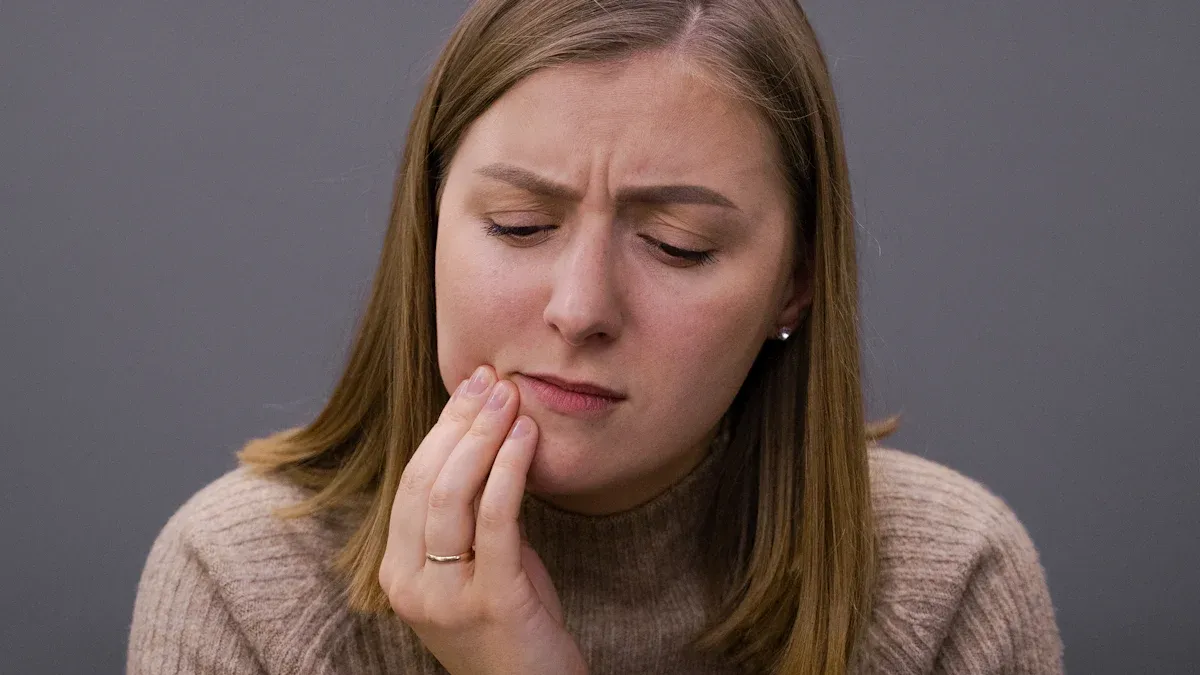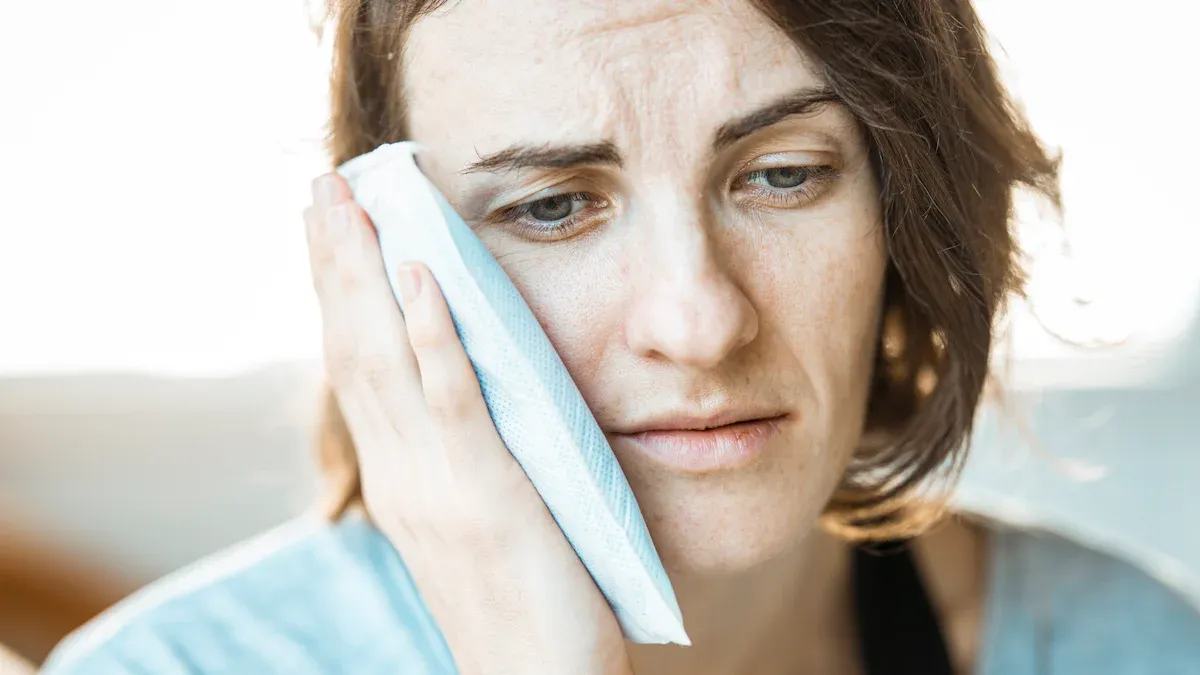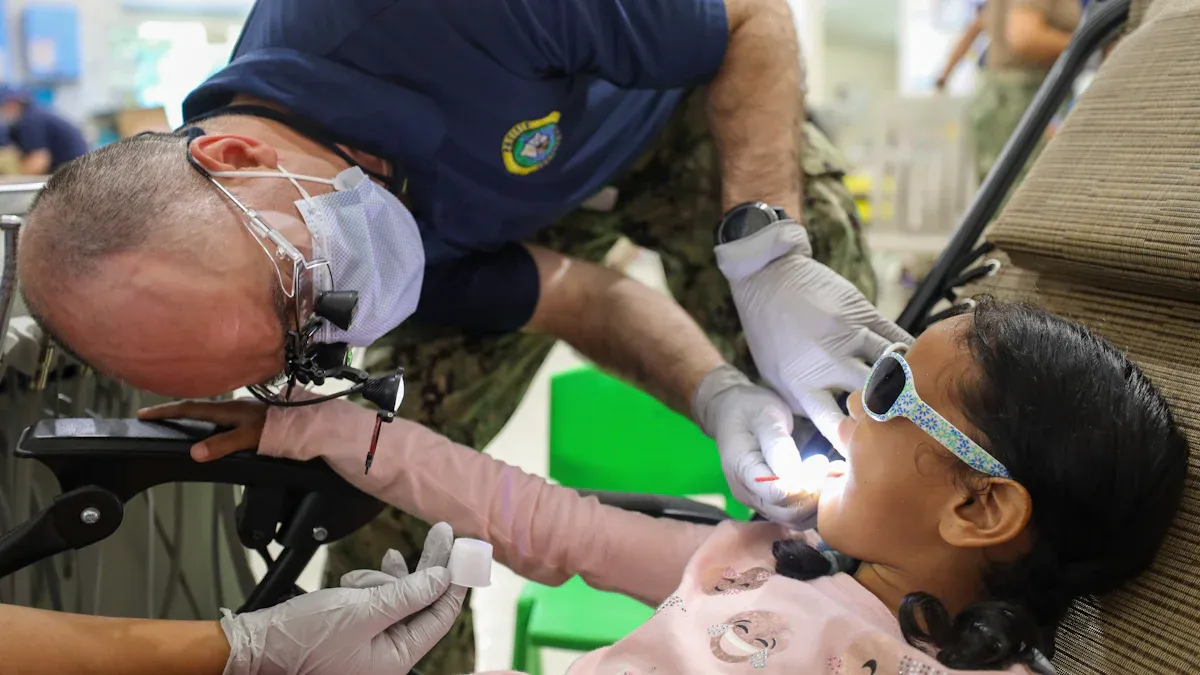Managing Swelling after Dental Emergencies in Birmingham

You can begin managing swelling straight away. Apply a cold compress to your cheek. Rinse your mouth with saltwater. Swelling often improves within a few days if you act promptly. Some common causes include:
- Toothache
- Dental avulsion
- Root fracture
- Injured cheek, lip or tongue
Stay calm and contact Robinhood dental practice if your condition worsens.
Key Takeaways
- Apply a cold compress to reduce swelling. Use a towel to avoid frostbite and repeat every 20 minutes for the first two days.
- Rinse your mouth with a saltwater solution to keep it clean and help healing. Mix half a teaspoon of salt in warm water and swish gently.
- Avoid hard, crunchy, or spicy foods while swelling persists. Opt for soft foods like mashed potatoes and drink plenty of fluids.
Managing Swelling at Home

Cold Compress
You can help with swelling by using a cold compress. Wrap a clean towel around an ice pack or frozen peas. Hold it gently on your cheek near the swollen spot. Keep it there for 20 minutes, then take it off for 20 minutes. Do this again and again for the first two days after your dental emergency. Some studies say cold compresses might help with pain. People are not sure if they help swelling. Do not use heat, because it can make swelling worse, especially if you have an infection.
Tip: Never put ice right on your skin. Always use a towel so you do not get frostbite.
Saltwater Rinse
A saltwater rinse helps keep your mouth clean after a dental injury. Mix half a teaspoon of salt in a glass of warm water. Swish it gently in your mouth for 30 seconds, then spit it out. You can do this up to three times a day. Saltwater rinses may not lower swelling, but they help stop infection and help healing. Do not use too much salt, because it can make your mouth sore or dry.
Note: Using saltwater rinses too much can make your mouth dry, hurt your tissues, or damage your enamel. Only use them when you need to.
Pain Relief
You can take over-the-counter pain relief to help with pain. Non-steroidal anti-inflammatory drugs (NSAIDs) like ibuprofen, aspirin, or naproxen help with dental pain and swelling. Paracetamol helps with pain, but does not lower inflammation. You can switch between NSAIDs and paracetamol if you need to, but always follow the instructions on the box. Topical gels with benzocaine or clove oil can numb the area for a short time. Do not use these medicines if you are allergic.
- NSAIDs: Help with pain and swelling.
- Paracetamol: Helps with pain only.
- Topical gels: Numb the sore spot.
Avoid Hard Foods
Do not eat hard, crunchy, sticky, or spicy foods while you have swelling. These foods can bother the injured area and make swelling worse. Hot or cold foods and drinks can also hurt. Pick soft foods like mashed potatoes, yoghurt, scrambled eggs, or soup with soft vegetables. Drink lots of fluids, but do not have alcohol or caffeine for at least two days.
Remember: Do not use heat on the swollen area. Heat can make swelling worse, especially if you have an infection.
Managing Swelling at home works best if you follow these steps and avoid things that make it worse. If swelling does not get better or gets worse, see a dental professional.
When to Seek Help
Signs of Infection
You should watch for signs of infection after a dental emergency. Infections can get worse quickly. Here is a table to help you spot the most common signs:
| Sign of Infection | Description |
|---|---|
| Persistent Tooth Pain | Severe, throbbing pain that gets worse, especially when you chew. |
| Swelling | Swelling in your gums or face, showing inflammation and fluid build-up. |
| Visible Pus | Thick, yellowish fluid around your teeth or gums. |
| Fever | A raised temperature, which means the infection may have spread. |
Other signs include redness in your gums and a foul taste or smell in your mouth. If you notice any of these, contact a dentist as soon as possible.
Severe Swelling
Severe swelling can mean the infection is spreading. You may see swelling in your gums, face, or neck. If you have swelling with a fever, this could lead to more serious problems. Swelling that gets worse quickly or makes it hard to open your mouth needs urgent care. Dentists look for these signs to decide if you need emergency treatment.
Tip: Managing Swelling at home helps, but if swelling spreads or you feel unwell, seek help right away.
Breathing or Swallowing Issues
If you find it hard to breathe or swallow, you must get emergency help. Swelling that blocks your throat or mouth can stop you from breathing or drinking. This is very dangerous. You may also feel short of breath or unable to take in liquids. These are warning signs that need immediate medical attention.
Emergency Dentists in Birmingham

Finding a Dentist
It is easy to find an emergency dentist in Birmingham if you know where to look. Many places can help you at any time. Some have hotlines or websites with lists of dentists. Here is a table with helpful contacts:
| Service Provider | Description | Contact Information |
|---|---|---|
| Emergency Dentist 24/7 | 24-hour referral network for fast appointments | 0121 744 1484 |
| Emergency Dentists USA | Listings of 24-hour dental services and a free hotline | Visit website or call for help |
| Aspen Dental | 24/7 services; check reviews and options online | Visit website for more details |
You can also ring your usual dentist. If they cannot help, try these services for quick help.
NHS and Private Options
You can pick NHS or private emergency dental care. NHS costs less but you might wait longer. Private clinics often see you faster and stay open later. Here is a table to show the costs:
| Service Type | Cost (GBP) |
|---|---|
| NHS Emergency Tooth Extraction (Band 2) | £75.30 |
| Private Simple Extraction | £95 – £250 |
| Private Complex Extraction | £220 – £450 |
| Private Surgical Extraction | £250 – £650+ |
| Private Wisdom Tooth Extraction | £450 – £650+ |
You can ring your NHS dentist, call NHS 111, or go to Birmingham Dental Hospital for urgent NHS care. Private dentists are often open on weekends and evenings.
Preparing for Your Visit
Bring your ID, a list of your medicines, and details about your dental problem. Try to arrive early. Tell the dentist about your pain, swelling, and allergies. If you feel worried, tell the staff. They can help you feel better. You might need to fill in a form before you see the dentist. Always listen to the dentist’s advice after your visit to heal well.
Preventing Complications
Oral Hygiene
You help stop problems after a dental emergency. Brush your teeth two times each day with a soft toothbrush. Floss gently once a day to clean away food and plaque. Use antibacterial mouthwash to lower bacteria in your mouth. Drink lots of water to keep your mouth wet and help it heal. If you do not clean your mouth, you may heal slower and get more problems. A clean mouth helps stop infections and helps your body heal. Oral health is linked to your whole body, so mouth infections can hurt other parts of you.
Tip: Stay away from spicy, acidic, or sugary foods. These foods can bother your gums and slow healing.
Here is a table of things you can do to prevent problems:
| Preventive Measure | Description |
|---|---|
| Wear a Mouthguard | Use one to protect your teeth when playing sports. |
| Avoid Hard Foods | Hard foods like ice or sweets can break your teeth. |
| Maintain Good Oral Hygiene | Brush and floss often to stop decay and gum disease. |
| Schedule Routine Checkups | Seeing your dentist early helps stop problems before they get worse. |
Monitoring Swelling
Check your swelling every day. Look in the mirror morning and night to see if it gets bigger or smaller. Take pain medicine like ibuprofen if you feel sore. Rinse your mouth with saltwater two times a day to help with swelling and kill germs. If you see redness, pus, or more pain, call your dentist. Do not smoke or chew tobacco, as these make gum problems worse.
- Brush and floss softly.
- Use saltwater rinses.
- Do not eat foods that bother your gums.
- Drink plenty of water.
Follow-Up Care
You need to see your dentist to heal well. Book a visit after your emergency, even if swelling goes down. Your dentist can find problems early and help stop new emergencies. Regular visits lower your chance of swelling and other dental issues. Listen to your dentist’s advice and go to all your appointments.
Note: Seeing your dentist soon helps you heal faster and keeps your mouth healthy for a long time.
You should act fast to help with swelling.
- Swelling that starts quickly can mean a big dental problem.
- If you do nothing, your health could get worse.
- Swelling gets bigger in one or two days, then goes down in a week.
Birmingham clinics such as Hall Cosmetic & Family Dentistry and White Oak Family Dentistry can see you the same day for emergencies. You can get better if you get help quickly.
FAQ
What should you do if swelling gets worse overnight?
You should contact an emergency dentist in Birmingham straight away. Swelling that gets worse quickly can mean a serious infection.
Can you use heat to reduce dental swelling?
Never use heat on a swollen area. Heat can make swelling and infection worse. Always use a cold compress instead.
How long does dental swelling usually last?
Most swelling goes down in three to seven days. If swelling stays longer or gets worse, you should see your dentist.

Leave a Reply
Want to join the discussion?Feel free to contribute!